- Home
- Leo Tolstoy
The Power of Darkness Page 5
The Power of Darkness Read online
Page 5
NEIGHBOR. That goes without saying.
ANISYA. Ah, how hard it is to bear such treatment from him! Oh, how it hurts!
NEIGHBOR. Yes, and I’ve heard say he’s becoming too free with his fists?
ANISYA. And that too! There was a time when he was gentle when he’d had a drop. He used to hit out before, but of me he was always fond! But now when he’s in a temper he goes for me and is ready to trample me under his feet. The other day he got both hands entangled in my hair so that I could hardly get away. And the girl’s worse than a serpent; it’s a wonder the earth bears such furies.
NEIGHBOR. Ah, ah, my dear, now I look at you, you are a sufferer! To suffer like that is no joke. To have given shelter to a beggar, and he to lead you such a dance! Why don’t you pull in the reins?
ANISYA. Ah, but my dear, if it weren’t for my heart! Him as is gone was stern enough, still I could twist him about any way I liked; but with this one I can do nothing. As soon as I see him all my anger goes. I haven’t a grain of courage before him; I go about like a drowned hen.
NEIGHBOR. Ah, neighbor, you must be under a spell. I’ve heard that Matryona goes in for that sort of thing. It must be her.
ANISYA. Yes, dear; I think so myself sometimes. Gracious me, how hurt I feel at times! I’d like to tear him to pieces. But when I set eyes on him, my heart won’t go against him.
NEIGHBOR. It’s plain you’re bewitched. It don’t take long to blight a body. There now, when I look at you, what you have dwindled to!
ANISYA. Growing a regular spindle-shanks. And just look at that fool Akoulina. Wasn’t the girl a regular untidy slattern, and just look at her now! Where has it all come from? Yes, he has fitted her out. She’s grown so smart, so puffed up, just like a bubble that’s ready to burst. And, though she’s a fool, she’s got it into her head, “I’m the mistress,” she says; “the house is mine; it’s me father wanted him to marry.” And she’s that vicious! Lord help us, when she gets into a rage she’s ready to tear the thatch off the house.
NEIGHBOR. Oh dear, what a life yours is, now I come to look at you. And yet there’s people envying you: “They’re rich,” they say; but it seems that gold don’t keep tears from falling.
ANISYA. Much reason for envy indeed! And the riches, too, will soon be made ducks and drakes of. Dear me, how he squanders money!
NEIGHBOR. But how’s it, dear, you’ve been so simple to give up the money? It’s yours.
ANISYA. Ah, if you knew all! The thing is that I’ve made one little mistake.
NEIGHBOR. Well, if I were you, I’d go straight and have the law of him. The money’s yours; how dare he squander it? There’s no such rights.
ANISYA. They don’t pay heed to that nowadays.
NEIGHBOR. Ah, my dear, now I come to look at you, you’ve got that weak.
ANISYA. Yes, quite weak, dear, quite weak. He’s got me into a regular fix. I don’t myself know anything. Oh, my poor head!
NEIGHBOR [listening] There’s someone coming, I think. [The door opens and Akim enters].
AKIM [crosses himself, knocks the snow off his feet, and takes off his coat] Peace be to this house! How do you do? Are you well, daughter?
ANISYA. How d’you do, father? Do you come straight from home?
AKIM. I’ve been a-thinking, I’ll go and see what’s name, go to see my son, I mean,—my son. I didn’t start early—had my dinner, I mean; I went, and it’s so what d’you call it—so snowy, hard walking, and so there I’m what d’you call it—late, I mean. And my son—is he at home? At home? My son, I mean.
ANISYA. No; he’s gone to the town.
AKIM [sits down on a bench] I’ve some business with him, d’you see, some business, I mean. I told him t’other day, told him I was in need—told him, I mean, that our horse was done for, our horse, you see. So we must what d’ye call it, get a horse, I mean, some kind of a horse, I mean. So there, I’ve come, you see.
ANISYA. Nikita told me. When he comes back you’ll have a talk. [Goes to the oven] Have some supper now, and he’ll soon come. Mitritch, eh Mitritch, come have your supper.
MITRITCH. Oh Lord! merciful Nicholas!
ANISYA. Come to supper.
NEIGHBOR. I shall go now. Good-night. [Exit].
MITRITCH [ gets down from the oven] I never noticed how I fell asleep. Oh Lord! gracious Nicholas! How d’you do, Daddy Akim?
AKIM. Ah, Mitritch! What are you, what d’ye call it, I mean? . . .
MITRITCH. Why, I’m working for your son, Nikita.
AKIM. Dear me! What d’ye call . . . working for my son, I mean. Dear me!
MITRITCH. I was living with a tradesman in town, but drank all I had there. Now I’ve come back to the village. I’ve no home, so I’ve gone into service. [Gapes] Oh Lord!
AKIM. But how’s that, what d’you call it, or what’s name, Nikita, what does he do? Has he some business, I mean besides, that he should hire a laborer, a laborer I mean, hire a laborer?
ANISYA. What business should he have? He used to manage, but now he’s other things on his mind, so he’s hired a laborer.
MITRITCH. Why shouldn’t he, seeing he has money?
AKIM. Now that’s what d’you call it, that’s wrong, I mean, quite wrong, I mean. That’s spoiling oneself.
ANISYA. Oh, he has got spoilt, that spoilt, it’s just awful.
AKIM. There now, what d’you call it, one thinks how to make things better, and it gets worse I mean. Riches spoil a man, spoil, I mean.
MITRITCH. Fatness makes even a dog go mad; how’s one not to get spoilt by fat living? Myself now; how I went on with fat living. I drank for three weeks without being sober. I drank my last breeches. When I had nothing left, I gave it up. Now I’ve determined not to. Bother it!
AKIM. And where’s what d’you call, your old woman?
MITRITCH. My old woman has found her right place, old fellow. She’s hanging about the gin-shops in town. She’s a swell too; one eye knocked out, and the other black, and her muzzle twisted to one side. And she’s never sober; drat her!
AKIM. Oh, oh, oh, how’s that?
MITRITCH. And where’s a soldier’s wife to go? She has found her right place. [Silence].
AKIM [to Anisya] And Nikita,—has he what d’you call it, taken anything up to town? I mean, anything to sell?
ANISYA [laying the table and serving up] No, he’s taken nothing. He’s gone to get money from the bank.
AKIM [sitting down to supper] Why? D’you wish to put it to another use, the money I mean?
ANISYA. No, we don’t touch it. Only some twenty or thirty roubles as have come due; they must be taken.
AKIM. Must be taken. Why take it, the money I mean? You’ll take some to-day I mean, and some tomorrow; and so you’ll what d’you call it, take it all, I mean.
ANISYA. We get this besides. The money is all safe.
AKIM. All safe? How’s that, safe? You take it, and it what d’you call it, it’s all safe. How’s that? You put a heap of meal into a bin, or a barn, I mean, and go on taking meal, will it remain there what d’you call it, all safe I mean? That’s, what d’you call it, it’s cheating. You’d better find out, or else they’ll cheat you. Safe indeed! I mean you what d’ye call . . . you take it and it remains all safe there?
ANISYA. I know nothing about it. Ivan Moseitch advised us at the time. “Put the money in the bank,” he said, “the money will be safe, and you’ll get interest,” he said.
MITRITCH [having finished his supper] That’s so. I’ve lived with a tradesman. They all do like that. Put the money in the bank, then lie down on the oven and it will keep coming in.
AKIM. That’s queer talk. How’s that—what d’ye call, coming in, how’s that coming in, and they, who do they get it from I mean, the money I mean?
ANISYA. They take the money out of the bank.
MITRITCH. Get along! ’Tain’t a thing a woman can understand! You look here, I’ll make it all clear to you. Mind and remember. You see, suppose you’ve got some money, an
d I, for instance, have spring coming on, my land’s idle, I’ve got no seeds, or I have to pay taxes. So, you see, I go to you. “Akim,” I say, “give us a ten-rouble note, and when I’ve harvested in autumn I’ll return it, and till two acres for you besides, for having obliged me!” And you, seeing I’ve something to fall back on—a horse say, or a cow—you say, “No, give two or three roubles for the obligation,” and there’s an end of it. I’m stuck in the mud, and can’t do without. So I say, “All right!” and take a tenner. In the autumn, when I’ve made my turnover, I bring it back, and you squeeze the extra three roubles out of me.
AKIM. Yes, but that’s what peasants do when they what d’ye call it, when they forget God. It’s not honest, I mean, it’s no good, I mean.
MITRITCH. You wait. You’ll see it comes just to the same thing. Now don’t forget how you’ve skinned me. And Anisya, say, has got some money lying idle. She does not know what to do with it, besides, she’s a woman, and does not know how to use it. She comes to you. “Couldn’t you make some profit with my money too?” she says. “Why not?” say you, and you wait. Before the summer I come again and say, “ Give me another tenner, and I’ll be obliged.” Then you find out if my hide isn’t all gone, and if I can be skinned again you give me Anisya’s money. But supposing I’m clean shorn,—have nothing to eat,—then you see I can’t be fleeced any more, and you say, “Go your way, friend,” and you look out for another, and lend him your own and Anisya’s money and skin him. That’s what the bank is. So it goes round and round. It’s a cute thing, old fellow!
AKIM [excitedly] Gracious me, whatever is that like? It’s what d’ye call it, it’s filthy! The peasants—what d’ye call it, the peasants do so I mean, and know it’s, what d’ye call it, a sin! It’s what d’you call, not right, not right, I mean. It’s filthy! How can people as have learnt . . . what d’ye call it . . .
MITRITCH. That, old fellow, is just what they’re fond of ! And remember, them that are stupid, or the women folk, as can’t put their money into use themselves, they take it to the bank, and they there, deuce take ’em, clutch hold of it, and with this money they fleece the people. It’s a cute thing!
AKIM [sighing] Oh dear, I see, what d’ye call it, without money it’s bad, and with money it’s worse! How’s that? God told us to work, but you, what d’ye call . . . I mean you put money into the bank and go to sleep, and the money will what d’ye call it, will feed you while you sleep. It’s filthy, that’s what I call it; it’s not right.
MITRITCH. Not right? Eh, old fellow, who cares about that nowadays? And how clean they pluck you, too! That’s the fact of the matter.
AKIM [sighs] Ahyes, seems the time’s what d’ye call it, the time’s growing ripe. There, I’ve had a look at the closets in town. What they’ve come to! It’s all polished and polished I mean, it’s fine, it’s what d’ye call it, it’s like inside an inn. And what’s it all for? What’s the good of it? Oh, they’ve forgotten God. Forgotten, I mean. We’ve forgotten, forgotten God, God I mean! Thank you, my dear, I’ve had enough. I’m quite satisfied. [Rises. Mitritch climbs onto the oven].
ANISYA [eats, and collects the dishes] If his father would only take him to task! But I’m ashamed to tell him.
AKIM. What d’you say?
ANISYA. Oh! it’s nothing.
Enter Nan.
AKIM. Here’s a good girl, always busy! You’re cold, I should think?
NAN. Yes, I am, terribly. How d’you do, grandfather?
ANISYA. Well? Is he there?
NAN. No. But Andriyan is there. He’s been to town, and he says he saw them at an inn in town. He says Dad’s as drunk as drunk can be!
ANISYA. Do you want anything to eat? Here you are.
NAN [ goes to the oven] Well, it is cold. My hands are quite numb. [Akim takes off his leg-bands and bast-shoes, Anisya washes up].
ANISYA. Father!
AKIM. Well, what is it?
ANISYA. And is Marina living well?
AKIM. Yes, she’s living all right. The little woman is what d’ye call it, clever and steady; she’s living, and what d’ye call it, doing her best. She’s all right; the little woman’s of the right sort I mean; painstaking and what d’ye call it, submissive; the little woman’s all right I mean, all right, you know.
ANISYA. And is there no talk in your village that a relative of Marina’s husband thinks of marrying our Akoulina? Have you heard nothing of it?
AKIM. Ah; that’s Mironof. Yes, the women did chatter something. But I didn’t pay heed, you know. It don’t interest me I mean, I don’t know anything. Yes, the old women did say something, but I’ve a bad memory, bad memory, I mean. But the Mironofs are what d’ye call it, they’re all right, I mean they’re all right.
ANISYA. I’m that impatient to get her settled.
AKIM. And why?
NAN [listens] They’ve come!
ANISYA. Well, don’t you go bothering them. [Goes on washing the spoons without turning her head ].
NIKITA [enters] Anisya! Wife! who has come? [Anisya looks up and turns away in silence].
NIKITA [severely] Who has come? Have you forgotten?
ANISYA. Now don’t humbug. Come in!
NIKITA [still more severely] Who’s come?
ANISYA [ goes up and takes him by the arm] Well then, husband has come. Now then, come in!
NIKITA [holds back] Ah, that’s it! Husband! And what’s husband called? Speak properly.
ANISYA. Oh bother you! Nikita!
NIKITA. Where have you learnt manners? The full name.
ANISYA. Nikita Akimitch! Now then!
NIKITA [still in the doorway] Ah, that’s it! But now—the surname?
ANISYA [laughs and pulls him by the arm] Tchilikin. Dear me, what airs!
NIKITA. Ah, that’s it. [Holds on to the door-post] No, now say with which foot Tchilikin steps into this house!
ANISYA. That’s enough! You’re letting the cold in!
NIKITA. Say with which foot he steps? You’ve got to say it,— that’s flat.
ANISYA [aside] He’ll go on worrying. [To Nikita] Well then, with the left. Come in!
NIKITA. Ah, that’s it.
ANISYA. You look who’s in the hut!
NIKITA. Ah, my parent! Well, what of that? I’m not ashamed of my parent. I can pay my respects to my parent. How d’you do, father? [Bows and puts out his hand ] My respects to you.
AKIM [does not answer] Drink, I mean drink, what it does! It’s filthy!
NIKITA. Drink, what’s that? I’ve been drinking? I’m to blame, that’s flat! I’ve had a glass with a friend, drank his health.
ANISYA. Go and lie down, I say.
NIKITA. Wife, say where am I standing?
ANISYA. Now then, it’s all right, lie down!
NIKITA. No, I’ll first drink a samovar with my parent. Go and light the samovar. Akoulina, I say, come here!
Enter Akoulina, smartly dressed and carrying their purchases.
AKOULINA. Why have you thrown everything about? Where’s the yarn?
NIKITA. The yarn? The yarn’s there. Hullo, Mitritch, where are you? Asleep? Asleep? Go and put the horse up.
AKIM [not seeing Akoulina but looking at his son] Dear me, what is he doing? The old man’s what d’ye call it, quite done up, I mean,—been thrashing,—and look at him, what d’ye call it, putting on airs! Put up the horse! Faugh, what filth!
MITRITCH [climbs down from the oven, and puts on felt boots] Oh, merciful Lord! Is the horse in the yard? Done it to death, I dare say. Just see how he’s been swilling, the deuce take him. Up to his very throat. Oh Lord, holy Nicholas! [Puts on sheepskin, and exits].
NIKITA [sits down] You must forgive me, father. It’s true I’ve had a drop; well, what of that? Even a hen will drink. Ain’t it true? So you must forgive me. Never mind Mitritch, he doesn’t mind, he’ll put it up.
ANISYA. Shall I really light the samovar?
NIKITA. Light it! My parent has come. I wish to talk to him, and shall drink tea w
ith him. [To Akoulina] Have you brought all the parcels?
AKOULINA. The parcels? I’ve brought mine, the rest’s in the sledge. Hi, take this, this isn’t mine!
Throws a parcel on the table and puts the others into her box. Nan watches her while she puts them away. Akim does not look at his son, but puts his leg-bands and bast-shoes on the oven.
ANISYA [ going out with the samovar] Her box is full as it is, and still he’s bought more!
NIKITA [ pretending to be sober] You must not be cross with me, father. You think I’m drunk? I am all there, that’s flat! As they say, “Drink, but keep your wits about you.” I can talk with you at once, father. I can attend to any business. You told me about the money; your horse is worn-out,—I remember! That can all be managed. That’s all in our hands. If it was an enormous sum that’s wanted, then we might wait; but as it is I can do everything. That’s the case.
AKIM [ goes on fidgeting with the leg-bands] Eh, lad, “It’s ill sledging when the thaw has set in.”
NIKITA. What d’you mean by that? “And it’s ill talking with one who is drunk”? But don’t you worry, let’s have some tea. And I can do anything; that’s flat! I can put everything to rights.
AKIM [shakes his head ] Eh, eh, eh!
NIKITA. The money, here it is. [Puts his hand in his pocket, pulls out pocket-book, handles the notes in it and takes out a ten-rouble note] Take this to get a horse; I can’t forget my parent. I shan’t forsake him, that’s flat. Because he’s my parent! Here you are, take it! Really now, I don’t grudge it. [Comes up and pushes the note towards Akim who won’t take it. Nikita catches hold of his father’s hand ] Take it, I tell you. I don’t grudge it.
AKIM. I can’t, what d’you call it, I mean, can’t take it! And can’t what d’ye call it, talk to you, because you’re not yourself, I mean.
NIKITA. I’ll not let you go! Take it! [Puts the money into Akim’s hand ].
ANISYA [enters, and stops] You’d better take it, he’ll give you no peace!
AKIM [takes it, and shakes his head ] Oh! that liquor! Not like a man, I mean!
NIKITA. That’s better! If you repay it you’ll repay it, if not I’ll make no bother. That’s what I am! [Sees Akoulina] Akoulina, show your presents.

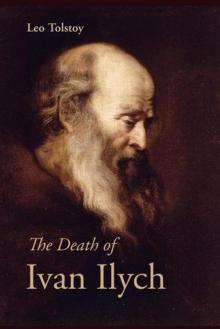 The Death of Ivan Ilych
The Death of Ivan Ilych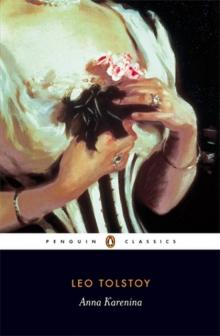 Anna Karenina
Anna Karenina Resurrection
Resurrection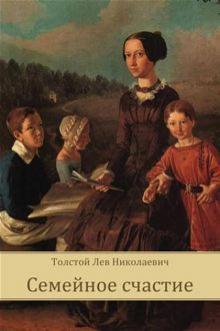 Family Happiness
Family Happiness War and Peace
War and Peace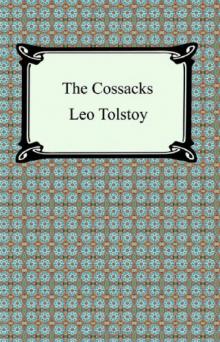 The Cossacks
The Cossacks The Kreutzer Sonata
The Kreutzer Sonata A Confession
A Confession The Kingdom of God Is Within You
The Kingdom of God Is Within You Father Sergius
Father Sergius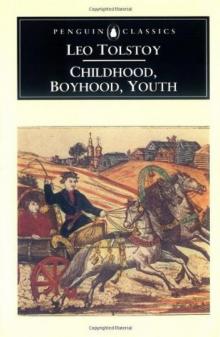 Childhood, Boyhood, Youth
Childhood, Boyhood, Youth Lives and Deaths
Lives and Deaths The Devil
The Devil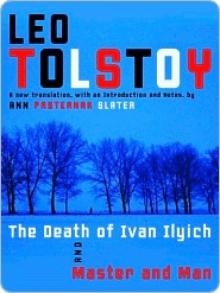 The Death of Ivan Ilyich and Master and Man
The Death of Ivan Ilyich and Master and Man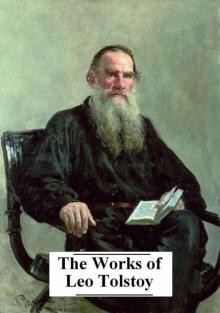 The Complete Works of Leo Tolstoy (25+ Works with active table of contents)
The Complete Works of Leo Tolstoy (25+ Works with active table of contents)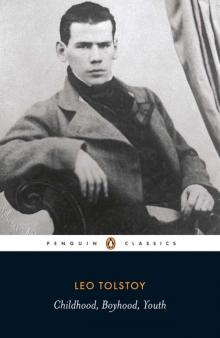 Childhood, Boyhood, Youth (Penguin ed.)
Childhood, Boyhood, Youth (Penguin ed.)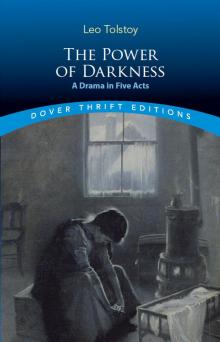 The Power of Darkness
The Power of Darkness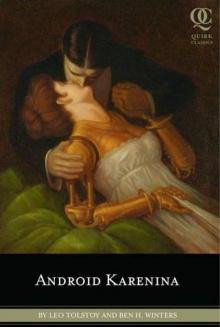 Android Karenina
Android Karenina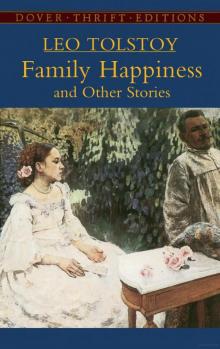 Family Happiness and Other Stories
Family Happiness and Other Stories The Lion and the Puppy
The Lion and the Puppy Collected Shorter Fiction, Volume 2
Collected Shorter Fiction, Volume 2 Collected Shorter Fiction, Volume 1
Collected Shorter Fiction, Volume 1